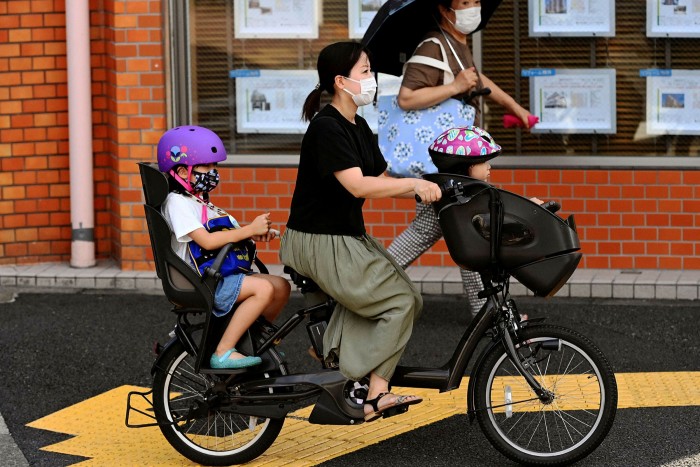[ad_1]
The risk of economies overheating in the wake of aggressive government spending to combat the coronavirus pandemic may be causing mounting concern in the US and Europe, but Japan is wrestling with the opposite problem.
Asia’s largest advanced economy has already spent ¥88tn ($770bn) in fiscal stimulus, or nearly 17 per cent of gross domestic product, since the start of the Covid-19 outbreak in 2020.
But just as many parts of the world recover and weigh options to unwind their stimulus measures amid rising inflation fears, Prime Minister Fumio Kishida is preparing a direct cash distribution of ¥100,000 ($872) to households with children younger than 18 as part of a huge economic package to be unveiled on Friday.
The challenge, however, is that stimulus cheques distributed in the past have done little to boost consumption and inflation in Japan, and there are few signs that the outcome will be different this time.
Concerns over additional stimulus measures are, however, mainly driven by Japan’s massive debt load, which has reached 266 per cent of its gross domestic product.
Overheating is less of a worry with Haruhiko Kuroda, governor of the Bank of Japan, forecasting inflation to increase to about only 1 per cent by the middle of next year.
Analysts said a bigger focus of the new package should be on ways to boost the economy’s longer-term growth through targeted investments in areas such as the labour force and public health infrastructure.
“This is not the best designed package nor the best timed package that the Japanese government could be doing,” said Adam Posen, president of the Peterson Institute for International Economics. “It is not clear that speeding up the recovery through temporary fiscal stimulus should be a priority.”
Direct cash payments are not even popular with the Japanese public. Polls show a majority of respondents question the rationale for supporting households with children younger than 18 with cheques and vouchers.
Kishida has sought to blunt criticism of wasteful spending by imposing an income cap, but the impact is limited since the cheques will still be delivered to roughly 90 per cent of households with children.
“Having a child or not is not an effective measure to gauge which households have been hit by coronavirus,” said Akihiro Morishige, senior researcher at Mitsubishi Research Institute.
In the previous distribution of ¥100,000 cheques to every Japanese citizen that began in May of last year, analysts estimated that about 70 per cent of the money ended up in bank savings.
“Even if about 30 per cent of the ¥2tn distributed to households with children are spent this time, that won’t do much to boost overall consumption,” Morishige added.
The second issue with the government’s economic package, which will reportedly include fiscal spending of more than ¥40tn ($350bn), is timing.
Japan has recovered more slowly from Covid-19 than other advanced nations with its economy contracting at an annualised rate of 3 per cent in the third quarter owing to the global supply chain disruption.
But even without the new stimulus measures, most economists predict a robust rebound in the final three months of the year thanks to the lifting of Covid-19 restrictions, high vaccination rates and a steep decline in the number of cases.
Critics said politics was the main reason why the economic package was being rolled out late. Talk of stimulus cheques emerged over the summer as Japan grappled with a record rise in Covid-19 cases and hosted the unpopular Tokyo Olympics.
Implementation was delayed, however, when Yoshihide Suga stepped down as prime minister, setting off a leadership race in the ruling Liberal Democratic party.
After Kishida won the contest in September, he called a general election for October, further delaying the dispatch of the direct payments. Some of the cheques will be delivered by the end of the year but most will only arrive in the first quarter of 2022.
“The time lag of the stimulus measures has emerged in a very bad way,” said Kiichi Murashima, Japan economist at Citigroup. “It really does feel like a policy that was formulated during the election period.”
There are also technical difficulties in delivering stimulus cheques to people hardest hit by the virus outbreak.
In addition to households with children, Kishida has said the money would be handed to struggling low-income households, temporary workers and students.
But Morishige said the Japanese government and local authorities lacked a digital identification system that would allow them to grasp real-time income data of citizens. That made it harder for officials to target efficiently the hardest hit citizens.
That is partly the reason, analysts said, why the economic package is expected to include a measure to reward points to people who have signed up to the unpopular My Number ID card system, which would allow authorities to build a digital infrastructure.
Beyond the stimulus cheques to fight Covid-19, the package will include subsidies for small and medium-sized businesses and financial support for rising energy prices.
Friday’s announcement is also expected to include investment in the country’s $90bn university endowment fund, money to strengthen semiconductor supply chains and tax breaks to promote wage hikes.
[ad_2]
Source link


